Atlantic Monthly Contributors's Blog, page 401
June 30, 2015
Misty Copeland, Athlete

There’s an obligatory scene in pretty much every movie about ballet, be it comedy or drama or dramedy: the scene that shows a ballerina—a svelte, usually very pale, usually very pretty ballerina—taking off her pointe shoes to reveal feet that are covered in bruises and blood. The scene is meant to evoke the various ironies and self-contradictions of ballet as art form: lightness enabled by strength, daintiness enabled by determination. Artistry and athleticism. Grace and grit. Whirling skirts and floating arms, all spinning and balancing and relying on flesh and bone.
Related Story
Misty Copeland on the Physicality of New Classical Ballet
But if ballet has traditionally both embraced and eschewed its core humanity, Misty Copeland, in her athleticism and in her fame, embodies it. She is, on top of everything else, an athlete. And she isn’t shy about presenting herself as such. So it’s significant that what ballet watchers have long expected has come to pass: Copeland has finally been named a principal at New York’s American Ballet Theater. This has come after her spending more than 14 years with the company, nearly eight of them as a soloist. The promotion makes Copeland the first African American female principal dancer in the company’s 75-year history. It also marks, however, a new chapter for ballet—not just as an art, but as a sport.
Copeland’s fame, The New York Times points out, has recently extended beyond dance circles. She has written both a memoir (2014’s Life in Motion), which carries the tag line “My Story of Adversity and Grace,” and a children's book. She’s been featured as one of Time magazine's 100 Most Influential People—oded by Nadia Comaneci as “ballet's breakout star”—and as a profile subject on 60 Minutes. She’s the subject of a documentary, A Ballerina's Tale, that premiered at Tribeca this year. She was a presenter at this year's Tony Awards. She currently has more than 500,000 followers on Instagram. She’s sponsored by the sports clothing manufacturer Under Armour.
The last of these might well be the most significant. The Under Armour sponsorship came in 2014, and it was a deal whose compensation, she said, exceeded her yearly ABT salary. Copeland has also starred in T-Mobile ads, and in Dr. Pepper ads. She’s endorsed Capezio dance wear and Sansha dance shoes and Lavazza coffee and Payless Shoe Source and Proactiv Solution. She works with the Boys and Girls Club.
All of this is to say: Misty Copeland doesn’t just look like an athlete or act like an athlete; she is an athlete—commercially on top of everything else. Her public image is not just one of a lovely ballerina, be-jeweled and be-tutu-ed, but also of an athlete who is also a savvy businessperson. She has made, just like any famous athlete will, commercial gain from her talents.
Which is an important declaration not just for Copeland herself, but for her sport. Which also happens to be her art.









Behold, the Short-Sleeved Suit

In July of 2010, the user WhoMD posted a request with the following title to a student doctor forum: “Short sleeved suit?”
“I bought the suit below,” WhoMD explained, providing a link to a picture of the garment in question, “because of an interview in August which will be very hot. I thought it looked professional but just wanted other opinions. I can return it.”
Those who clicked through to the link’s image expressed their relief: The suit, a Tahari number, included a short-sleeved jacket, belted to cinch the waist, and a skirt. It was meant to be worn by a woman.
“Cute,” said one. “Glad you’re a girl and not a guy though.”
“I hope you’re a chick,” said another.
“Yeah,” agreed another, “I was going into this thread assuming at [sic] the OP was a guy. Would’ve said he’d look like a male stripper.”
“love it! i too was imagining a short sleeved suit on a guy. not ok.”
To all of which WhoMD responded: “thanks. I am a chick by the way. I don't think I’d have the guts to wear that if I was a male haha.”
Haha indeed. Suits may be an equal-opportunity affair, gender-wise, as species of professional attire; they’re most readily associated, however, with dudes. Which is why it was a little bit surprising, and also a little bit jarring, and also a little bit hilarious, when the Swedish brand Acne Studios released its Spring-Summer 2016 menswear line to reveal suits whose jackets sport ... short sleeves. Cuffed short sleeves, no less!
 Acne Studios
Acne Studios This is, on the one hand, yet another instance of fashion being fashion—designers working with the limited material they have, literally, to advance not just streetwear trends, but also ideas and provocations. Suits, the prototypical pieces of menswear, are particularly apt to that end because they’re unparalleled as symbols of conformity: Suits have been passed down, adjusted but not fundamentally unaltered, from the courts of King Charles II and King Louis XIV in the 1600s—drab, largely uniform getups whose point was to prevent expressions of individuality. The suit today, GQ points out, is “the one article of men’s clothing that sees immense change season to season through different fabrics, fits, and price, and yet hardly changes at all.”
In that sense, Acne’s sassy half-sleeve makes sense. Thom Browne is credited with and/or blamed for making the short suit a thing; now Acne is trying to put its stamp on the cropped shirt sleeve.
The short-sleeved suit for men, though, is also remarkable in its ability to complicate the conversation WhoMD and her bevy of advice-givers had back in 2010. That short sleeves should be acceptable—and “cute,” and all that—on a suit made for a woman, but not on one made for a guy, is the stuff of thoughtless double-standard, just like so much else in fashion. Menswear features short-sleeved shirts; there’s no reason jackets shouldn’t, er, follow suit. The only reason is the biases and expectations we tend to group under the collective heading of “tradition.” The only reason is that we expect that it’s women who will expose their flesh in professional settings, not men.
Acne is playing with those double standards, toying with them, subverting them—turning them into questions. The brand’s androgynous presentations of the garments in its 2016 catalog—combining them with collarless shirts, ribbon-like belts, and handbags—makes that even more clear. The brand is asking, on the one hand: “What does it mean to be a suit?” But it is also asking, on some deeper level—by way of ribbons and pockets and insistently sassy short sleeves—“What does it mean to be a man?”









The Origins of 'Fundamentalism'

ASPEN, Colo.—A decades-old debate continues to simmer at the intersection of religion and lexicography: When is it right to apply the word “fundamentalism” outside its original Protestant Christian context?
Today, “fundamentalism” is often applied as a pejorative, used almost interchangeably with words such as “extremism.” But Curtis Lee Laws, the Baptist pastor widely credited with popularizing the term, intended it as a positive description of his faith. Laws was referring to “The Fundamentals,” a series of essays published between 1910 and 1916 that laid out the core tenets of true Christian belief. The essays held that concepts such as the virgin birth of Christ and belief in a living God are “fundamental” to Christianity in all its forms.
 Dispatches from the Aspen Ideas Festival/Spotlight Health
Dispatches from the Aspen Ideas Festival/Spotlight HealthRead More
In calling himself a fundamentalist, Laws was contrasting his own faith with that of modern Christians who interpreted some of the Bible’s more supernatural concepts somewhat flexibly. “Fundamentalism is a protest against that rationalistic interpretation of Christianity which seeks to discredit supernaturalism,” Laws wrote in 1922. “This rationalism, when full grown, scorns the miracles of the Old Testament, sets aside the virgin birth of our Lord as a thing unbelievable, laughs at the credulity of those who accept many of the New Testament miracles, reduces the resurrection of our Lord to the fact that death did not end his existence, and sweeps away the promises of his second coming as an idle dream.”
After being adopted by Laws, however, the idea of fundamentalism spread beyond core doctrinal beliefs and became gradually identified with a set of attitudes about proper Christian behavior and thought—against drinking and dancing, against the teaching of evolution in schools. And so the term began to acquire its modern connotations of rigid orthodoxy.
In a presentation at the Aspen Ideas Festival, the author and religious scholar Karen Armstrong argued the word is too broadly applied. “It made perfect sense to the Americans in the 1920s when they coined the phrase,” Armstrong told me after her session had ended, “because they were going back to the ‘fundamentals’ of Christianity.” But when people talk about “fundamentalist Islam,” for example, Armstrong said, they’re connecting two ideas that fit poorly atop one another, and giving the false impression “that ‘fundamentalism’ is a monolithic movement throughout the world.”
Armstrong is joining a roiling, decades-long debate about how or whether the word should be applied outside of its original Protestant Christian origin. The late Hans Jansen, a Dutch scholar often critical of Islam, considered the debate long ended, as this acerbic passage from his 1997 book The Dual Nature of Islamic Fundamentalism indicates:
The late 1970s and the 1980s also saw an infertile discussion on the question whether it was proper to use the term ‘fundamentalism’ of developments taking place in the world of Islam. Was this term not much too simplistic to give adequate expression to such a complicated phenomenon? In a way the discussion on the word ‘fundamentalism’ echoes the discussion once caused by the invention of the telephone. Would not the term ‘telephone’ be much too simplistic? Would it do justice to the beauty and the many possibilities of the device? How about ‘speaking telegraph’ or ‘electrical speaking telephone’?
Both Muslims and friends of the Islamic world feared that the word ‘fundamentalism’ had too much of a Christian flavour. Did it not stem from a North American Christian milieu, and was it not actually coined around 1920, and then by a journalist? Would not a term like ‘revolutionary extremist neotraditionalist ultra-Islamic radicalism’ be preferable?
Khalid Yahya Blankinship, a Muslim scholar of Islam, takes a different view in his book, Fundamentalism: Perspectives on a Contested History:
When the term ‘fundamentalism’ began to be applied to various trends among Muslims in the 1970s, it soon came into wide and somewhat indiscriminate use. But what exactly its users meant by the term and why especially they began to use it at that time have remained rather unclear. While at its origin in 1920, the term referred to a specific Christian movement and tendency in the United States, even being taken up by some as a self-identity, it also tended from the outset to be used to classify others rather than the self. After it began to be applied to non-Christians, especially Muslims, its coherence dwindled, as different commentators used it rather indiscriminately to refer to various tendencies and trends among Muslims. The result today has been a confusion of different definitions, often mutually exclusive or contradictory.
Even today’s Christians argue about the word’s usefulness. “‘Fundamentalist’ is a term that is frequently bandied about in the news media these days,” begins an essay by Larry Eskridge, a scholar of American religion at Wheaton College. “Casually invoked to describe anyone who seems to hold some sort of vaguely-perceived traditional religious belief—be they a Bible Baptist TV preacher, a Hasidic rabbi, a Mormon housewife, or a soldier of the Islamic Jihad—the word has become so overused as to be nearly useless.” This 2010 Reddit AMA from a self-proclaimed fundamentalist Christian sets the word in quotation marks. (I am a “fundamentalist” Christian. Ask me anything!)
But the notable thing about that Reddit thread is the author’s own definition of fundamentalism: “I mean that I believe in what I see as the ‘fundamentals’ of Christianity.” You may have to go to Reddit to find them, but someone, somewhere is using the word exactly as Curtis Lee Laws once intended.









The 2016 U.S. Presidential Race: A Cheat Sheet
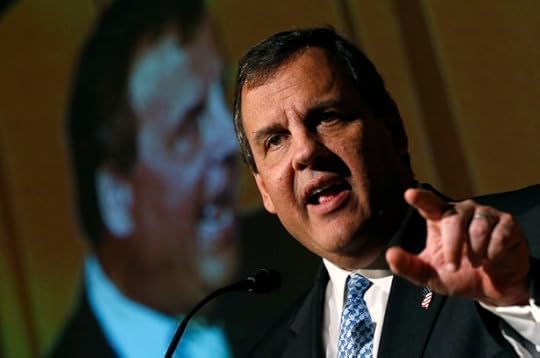
Did Chris Christie already miss his chance to be president? Back in 2012, the New Jersey governor was wildly popular at home, Republicans were clamoring for him to enter the presidential race, and donors were lined up to write checks.
When he jumped into the race Tuesday, he did so as a beleaguered insurgent. He’s among the last entrants to a crowded field, he has much ground to cover in fundraising, and his political fortunes are in tatters. Just three in 10 New Jerseyans approve of his handling of his job, and Christie’s favorability is deeply underwater among Republican primary voters.
Clearly, it’s been a rough three years for Christie. One might peg the start as Christie’s speech at the 2012 Republican National Convention, panned by party insiders as self-serving; or perhaps it was his embrace of President Obama on an airstrip after Hurricane Sandy. Then there was “Bridgegate,” the controversy over lane closures on the George Washington Bridge. While Christie himself has escaped legal trouble so far, two former top aides have been charged with crimes and a third has pled guilty. The scandal is particularly damaging for Christie, who says he was unaware of the apparently politically punitive closures, since his case for office rests on credibility and competence. While it’s gotten less national attention, Christie’s stateside struggles have a lot to do with the Garden State economy. Atlantic City is shutting down. (Maybe everything that dies someday comes back, but not soon enough for Christie’s campaign.) The state’s debt rating has been cut nine times during the Christie governorship. A judge also ruled that a Christie plan to cut pension payments was illegal.
But Christie has always thrived off his opponents’ bile, meeting theirs with his own, doubled. (Christie, who has famously feuded with teachers throughout his tenure, is announcing his campaign at his old high school, even though the teachers and local superintendent there dislike him and disagree with him on everything. It’s hard to imagine a more Chris Christie way to launch a campaign than to thumb his nose at them in the process.) That doesn’t make his path any easier. Squeezed by his own bad numbers and with Jeb Bush likely to soak up the moderate and establishment voters Christie needed, he will need a dominant showing in New Hampshire and perhaps a few miracles to make it to the RNC in Cleveland.
With so many candidates in the mix—some announced, some soon to announce, and some still on the fence—it’s tough to keep track of it all. To help out with that, this cheat sheet on the state of the presidential field will be periodically updated throughout the campaign season. Here's how things look right now.
* * *
The Republicans David Shankbone
David Shankbone Chris Christie
Who is he? What’s it to you, buddy? The combative New Jerseyan is in his second term as governor and previously served as a U.S. attorney.
Is he running? Christie kicks off his campaign June 30 at Livingston High School, his alma mater.
Who wants him to run? Moderate and establishment Republicans who don't like Bush or Romney; big businessmen, led by Home Depot founder Ken Langone.
Can he win the nomination? The tide of opinion had turned against Christie even before the "Bridgegate" indictments. It's hard to imagine how he recovers at this point, given the crowded field and the fact that Jeb Bush seems to dominate the moderate end of the Republican Party. Citing his horrific favorability numbers, FiveThirtyEight bluntly puns that “Christie's access lanes to the GOP nomination are closed.”
What else do we know? If you can tell what is going on in this GIF, please let me know. Is he tossing the jacket away? Or catching it? And what does it mean?
Does his website have a good 404 page? We would have gone with the GIF, but sure.
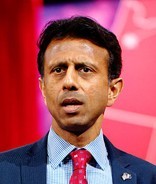 Gage Skidmore
Gage Skidmore Bobby Jindal
Who is he? A former Rhodes Scholar, he’s the outgoing governor of Louisiana. He previously served in the U.S. House.
Is he running? Yes. He kicked off his campaign on June 24.
Who wants him to run? It’s hard to say. Jindal has assiduously courted conservative Christians, both with a powerful conversion story (he was raised Hindu but converted to Catholicism in high school) and policies (after other governors reversed course, he charged forward with a religious-freedom law). But he still trails other social conservatives like Ted Cruz and Mike Huckabee.
Can he win the nomination? Probably not. Jindal still lacks traction at the national level, he faces an overcrowded field of social conservatives, and his stewardship of the state of Louisiana has come in for harsh criticism even from staunch fiscal conservatives. It’s hard to see how he gains momentum from here.
What else do we know? In 1994, he wrote an article called “Physical Dimensions of Spiritual Warfare,” in which he described a friend’s apparent exorcism.
Does his website have a good 404 page? Meh. Good joke, but past its expiration date.
 Gage Skidmore
Gage Skidmore Donald Trump
Who is he? The real-estate developer and reality-TV star fired TV personality almost certainly isn’t worth as much as he wants you to think he is.
Is he running? Like, for real? Of course not. He declared on June 16 and, incredibly, he has filed with the FEC, but the question to watch is what happens when he has to file financial disclosures.
Who wants him to run? Jon Stewart; Donald Trump.
Can he win the nomination?

What else do we know? I’m deeply ashamed and upset that I had to fill out this entry.
 Gage Skidmore
Gage Skidmore Jeb Bush
Who is he? The brother and son of presidents, he served two terms as governor of Florida, from 1999 to 2007.
Is he running? Yes, as of June 15.
Who wants him to run? Establishment Republicans; George W. Bush; major Wall Street donors.
Can he win the nomination? No one really knows. Since jumping into the race, he has continued to poll well and raise lots of money. He seems like a lock to rack up all-important endorsements from top Republicans. But predictions that he would quickly come to dominate the field have not come to pass, and while many analysts predicted that his moderate record would cause trouble in Iowa and with grassroots activists, that problem seems to be deeper than expected. His poll numbers are probably helped by his name, which is a double-edged sword.
What else do we know? Since Bush's surprise announcement, he has tended to stay fairly quiet, delivering some big speeches and hitting fundraisers, but not making a great number of trips to Iowa or New Hampshire.
Does his website have a good 404 page? Yes—y en español también.
 Gage Skidmore
Gage Skidmore Rick Perry
Who is he? George W. Bush’s successor as governor of Texas, he entered the 2012 race with high expectations, but sputtered out quickly. He left office in 2014 as the Lone Star State’s longest-serving governor.
Is he running? Yes. He announced on June 4.
Who wants him to run? Small-government conservatives; Texans; immigration hardliners; foreign-policy hawks. Noah Rothman makes a case here. (Perry's top backer four years ago, non-relative Bob Perry, died in 2013.)
Can he win the nomination? Maybe, but who knows? Perry and his backers insist 2016 Perry will be the straight shooter who oversaw the so-called Texas miracle, not the meandering, spacey Perry of 2012. We'll see. Perry has also made a point of quietly spending lots of time in Iowa, a strategy he didn’t use in 2012—but which Rick Santorum used very successfully.
Does his website have a good 404 page? That depends. Is this an “oops” joke? If so, yes.
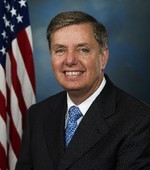 Wikimedia
Wikimedia Lindsey Graham
Who is he? A senator from South Carolina, he’s John McCain’s closest ally in the small caucus of Republicans who are moderate on many issues but very hawkish on foreign policy.
Is he running? He sure is. Graham kicked off the campaign June 1.
Who wants him to run? John McCain, naturally. Senator Kelly Ayotte, possibly. Joe Lieberman, maybe?
Can he win the nomination? Not really. The South Carolina senator seems to be running in large part to make sure there’s a credible, hawkish voice in the primary. It seems like Graham started his campaign almost as a lark but has started to enjoy the ride, plus he’s shown he’s a great performer on the stump. Molly Ball explores his chances at greater length here.
What else do we know? Graham promises to have a rotating first lady if he wins. We nominate Lana del Ray.
 Michael Vadon
Michael Vadon George Pataki
Who is he? Pataki ousted incumbent Mario Cuomo in 1994 and served three terms as governor of New York.
Is he running? Yes. He announced May 28.
Who wants him to run? It's not clear. Establishment Northeastern Republicans once held significant sway over the party, but those days have long since passed.
Can he win the nomination? No. As my colleague Russell Berman previously noted, Pataki is one of the longest of the long-shot GOP candidates. He has touted his leadership on 9/11, when he served as governor, but so did former New York City Mayor Rudy Giuliani. He was also a successful conservative governor in a deep-blue Northeastern state, but so was former Massachusetts Governor Mitt Romney. He seems to be socially liberal enough to alienate primary voters, but not enough to capture Democrats.
Does his website have a good 404 page? No.
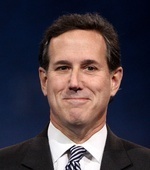 Gage Skidmore
Gage Skidmore Rick Santorum
Who is he? Santorum represented Pennsylvania in the Senate from 1995 until his defeat in 2006. He was the runner-up for the GOP nomination in 2012.
Is he running? Yes, with a formal announcement on May 27.
Who wants him to run? Social conservatives. The former Pennsylvania senator didn't have an obvious constituency in 2012, yet he still went a long way, and Foster Friess, who bankrolled much of Santorum's campaign then, is ready for another round.
Can he win the nomination? It's tough to imagine. Santorum himself said his chances would hinge on avoiding saying "crazy stuff that doesn't have anything to do with anything." For now, his poll numbers remain in the basement.
Does his website have a good 404 page? No.
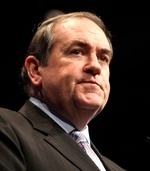 Gage Skidmore
Gage Skidmore Mike Huckabee
Who is he? An ordained preacher, former governor of Arkansas, and Fox News host, he ran a strong campaign in 2008, finishing third, but sat out 2012.
Is he running? Yes. He kicked off the campaign May 5.
Who wants him to run? Social conservatives; evangelical Christians.
Can he win the nomination? Huckabee's struggle will be to prove that he's still relevant. Since he last ran in 2008, a new breed of social conservatives has come in, and he'll have to compete with candidates like Ted Cruz. His brand of moral crusading feels a bit out of date in an era of widespread gay marriage—not least when he curiously chose to attack Beyoncé. (His statements in support of Josh Duggar have also earned him criticism and quizzical reaction.) He faces fire from strict anti-tax conservative groups for tax hikes while he was governor. And fundraising has always been his weak suit. But Huckabee's combination of affable demeanor and strong conservatism resonates with voters.
Does his website have a good 404 page? It’s pretty good.
 Gage Skidmore
Gage Skidmore Ben Carson
Who is he? A celebrated former head of pediatric neurosurgery at Johns Hopkins, Carson became a conservative folk hero after a broadside against Obamacare at the 2013 National Prayer Breakfast.
Is he running? Yes, after a May 4 announcement.
Who wants him to run? Grassroots conservatives, who have boosted him up near the top of polls, even as Republican insiders cringe. Carson has an incredibly appealing personal story—a voyage from poverty to pathbreaking neurosurgery—and none of the taint of politics.
Can he win the nomination? Almost certainly not. Carson's politics are conservative on some issues, but so eclectic as to be nearly incoherent overall. He's never run a political campaign, and has a tendency to do things like compare ISIS to the Founding Fathers. Despite initially building a formidable organization, he’s struggled to keep it together, with a rash of top staffers defecting.
Does his website have a good 404 page? No.
 Gage Skidmore
Gage Skidmore Carly Fiorina
Who is she? Fiorina rose through the ranks to become CEO of Hewlett-Packard from 1999 to 2005, before being ousted in an acrimonious struggle. She advised John McCain’s 2008 presidential campaign and unsuccessfully challenged Senator Barbara Boxer of California in 2010.
Is she running? Yes, as of a May 4 announcement.
Who wants her to run? It isn’t clear what Fiorina’s constituency is. She’s a former CEO of Hewlett-Packard, but there are other business-friendly candidates in the race, all of whom have more electoral experience.
Can she win the nomination? Almost certainly not. Fiorina’s only previously political experience was a failed Senate campaign against Barbara Boxer in 2010. She has mostly been serving the role of harasser in the race so far, stirring up the news with slams on environmentalists for causing droughts (your guess is as good as mine), Obama for backing net neutrality, and Apple’s Tim Cook for speaking out on Indiana’s Religious Freedom Restoration Act. Mainly, though, she has strongly criticized Hillary Clinton, and some Republican strategists like the optics of having a woman to criticize Clinton so as to sidestep charges of sexism. Fiorina seems to be wowing voters in Iowa, but that hasn’t translated into national support—yet.
What else do we know? Fiorina's 2010 Senate race produced two of the most entertaining and wacky political ads ever, "Demon Sheep" and the nearly eight-minute epic commonly known as "The Boxer Blimp."
Does her website have a good 404 page? No.
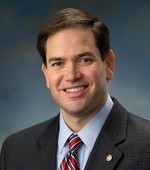 Wikimedia
Wikimedia Marco Rubio
Who is he? A second-generation Cuban-American and former speaker of the Florida House, Rubio was catapulted to national fame in the 2010 Senate election, after he unexpected upset Governor Charlie Crist to win the GOP nomination.
Is he running? Yes—he announced on April 13.
Who wants him to run? Rubio enjoys establishment support, and has sought to position himself as the candidate of an interventionist foreign policy.
Could he win the nomination? Charles Krauthammer pegs him as the Republican frontrunner. His best hope seems to be to emerge as a consensus candidate who can appeal to social conservatives and hawks, and he's even sounded some libertarian notes of late. He's well-liked by Republicans, and has surged forward since announcing, but he needs to move up from second choice to first choice for more of them. Rubio seems to scare Democrats more than any other candidate, too.
Does his website have a good 404 page? It’s decent.
 Wikimedia
Wikimedia Rand Paul
Who is he? An ophthalmologist and son of libertarian icon Ron Paul, he rode the 2010 Republican wave to the Senate, representing Kentucky.
Is he running? Yes, as of April 7.
Who wants him to run? Ron Paul fans; Tea Partiers; libertarians; civil libertarians; non-interventionist Republicans.
Can he win the nomination? That depends who you ask. The Kentucky senator would be an unorthodox pick, with many positions outside his party's mainstream. He's relatively permissive on drugs, passionate about civil liberties, and adamantly in favor of restraint on foreign policy. But Paul has worked hard to firm up establishment ties since reaching the Senate, and he has recently worked to paper over his differences with GOP’s hawkish wing, calling for a declaration of war against ISIS and generally saber-rattling. He is positioning himself as a candidate with crossover appeal in the general election, and his announcement email mocked the idea that only an establishment candidate can win a general election.
What else do we know? One of Paul's greatest strengths is the base bequeathed to him by his father, three-time presidential candidate and former Representative Ron Paul. But as The Washington Post has reported, his father is also Senator Paul's biggest headache.
Does his website have a good 404 page? No.
 Wikimedia
Wikimedia Ted Cruz
Who is he? Cruz served as deputy assistant attorney general in the George W. Bush administration and was appointed Texas solicitor general in 2003. In 2012, he ran an insurgent campaign to beat a heavily favored establishment Republican for Senate.
Is he running? Yes. He launched his campaign March 23 at Liberty University in Virginia.
Who wants him to run? Hardcore conservatives; Tea Partiers who worry that Rand Paul is too dovish on foreign policy; social conservatives.
Can he win the nomination? Though his announcement gave Cruz both a monetary and visibility boost, he still starts with some serious weaknesses. Much of Cruz's appeal to his supporters—his outspoken stances and his willingness to thumb his nose at his own party—also imperil him in a primary or general election, and he's sometimes been is own worst enemy when it comes to strategy. But Cruz is familiar with running and winning as an underdog.
Does his website have a good 404 page? No.
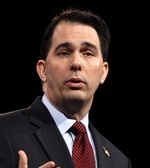 Gage Skidmore
Gage Skidmore Scott Walker
Who is he? Elected governor of Wisconsin in 2010, Walker earned conservative love and liberal hate for his anti-union policies. In 2013, he defeated a recall effort, and he won reelection the following year.
Is he running? Almost certainly.
Who wants him to run? Walker's record as governor of Wisconsin excites many Republicans. He's got a solid résumé as a small-government conservative. His social-conservative credentials are also strong, but without the culture-warrior baggage that sometimes brings. And Walker has won three difficult elections in a blue-ish state.
Can he win the nomination? No one knows. For all his strengths, Walker has never run a national campaign and isn't exactly Mr. Personality. But Jeb Bush's emergence seems to have helped Walker, propelling him to the front of the pack as a more conservative alternative to Bush. He's now solidly in the top tier of candidates.
When will he announce? July 13, perhaps. He’s waiting until after the June 30 deadline for the Wisconsin state budget.
What else do we know? Barack Obama took a shot on April 7 at Walker for his criticism of a nuclear-deal framework with Iran. That's a sign that he's becoming a power player, and sniping from the White House is only likely to elevate Walker's standing with Republicans. Good news, bad news: Walker has a geographic advantage in his proximity to Iowa, but a potential biological disadvantage from his allergy to dogs.
 Gage Skidmore
Gage Skidmore Sarah Palin
Who is she? If you have to ask now, you must not have been around in 2008. That’s when John McCain selected the then-unknown Alaska governor as his running mate. After the ticket lost, she resigned her term early and became a television personality.
Is she running? A bizarre speech in January made a compelling case both ways.
Who wants her to run? Palin still has diehard grassroots fans, but there are fewer than ever.
Can she win the nomination? No.
When will she announce? It doesn't matter.
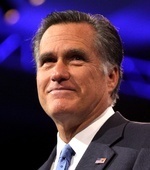 Gage Skidmore
Gage Skidmore Mitt Romney
Who is he? The Republican nominee in 2012 was also governor of Massachusetts and a successful businessman.
Is he running? Nah. He announced in late January that he would step aside.
Who wanted him to run? Former staffers; prominent Mormons; Hillary Clinton's team. Romney polled well, but it's hard to tell what his base would have been. Republican voters weren't exactly ecstatic about him in 2012, and that was before he ran a listless, unsuccessful campaign. Party leaders and past donors were skeptical at best of a third try.
Could he have won the nomination? He proved the answer was yes, but it didn't seem likely to happen again.
 Gage Skidmore John Bolton
Gage Skidmore John Bolton Who is he? A strident critic of the UN and leading hawk, he was George W. Bush’s ambassador to the UN for 17 months.
Is he running? Nope. After announcing his announcement, in the style of the big-time candidates, he posted on Facebook that he wasn’t running.
Who wanted him to run? Even among super-hawks, he didn’t seem to be a popular pick, likely because he had no political experience.
Could he have won the nomination? They say anything is possible in politics, but this would test the rule. A likelier outcome could be a plum foreign-policy role in a hawkish GOP presidency.
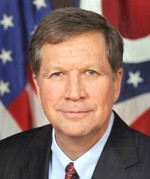 Wikimedia
Wikimedia John Kasich
Who is he? The current Ohio governor ran once before, in 2000, after a stint as Republican budget guru in the House. Between then and his election in 2010, he worked at Lehman Brothers. Molly Ball wrote the definitive profile in April.
Is he running? Almost certainly. He has visited early states, laid out ideas, and established a PAC.
Who wants him to run? Kasich’s pitch: He’s got better fiscal-conservative bona fides than any other candidate in the race, he’s proven he can win blue-collar voters, and he’s won twice in a crucial swing state. While his polling isn’t stellar, he still leads Graham, Fiorina, and Jindal.
Can he win the nomination? As Ball noted, Kasich seems in some ways perfectly suited to this race; in other ways, his insistent anti-charisma makes it hard to imagine him winning, and his attitude is amusingly blasé: “If they like it, great. If they don’t like it, I’ll play more golf.” He could be hurt by his embrace of Medicaid expansion under Obamacare, a move he had to circumvent the Republican-led General Assembly to make.
When will he announce? July 21 at the Ohio State University.
What else do we know? He doesn’t own a smartphone, and seldom uses a computer. Maybe he can be friends with Lindsey Graham—the old way, via U.S. Mail.
Others Still in the Mix:
Bob Ehrlich, Peter King, Harold Stassen, Jim Gilmore
* * *
The Democrats Wikimedia
Wikimedia Hillary Clinton
Who is she? As if we have to tell you, but: She’s a trained attorney; former secretary of State in the Obama administration; former senator from New York; and former first lady.
Is she running? Yes.
Who wants her to run? Most of the Democratic Party.
Can she win the nomination? Duh.
What else do we know? Maybe a better question, after so many years with Clinton on the national scene, is what we don't know. Here are 10 central questions to ask about the Hillary Clinton campaign.
Does her website have a good 404 page? If you’re tolerant of bad puns and ’90s ’80s outfits, the answer is yes.
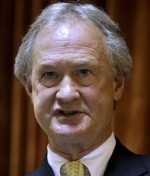 Steven Senne / AP
Steven Senne / AP Lincoln Chafee
Who is he? The son of beloved Rhode Island politician John Chafee, Linc took his late father’s seat in the U.S. Senate, serving as a Republican. He was governor, first as an independent and then as a Democrat.
Is he running? Yes—he announced his run at George Mason University on June 3.
Who wants him to run? Beyond metric-system boosters? No one knows! Even in Rhode Island, Chafee doesn’t have much support—he opted not to seek reelection as governor in 2014, in part because his approval rating had reached a dismal 26 percent.
Can he win the nomination? No. Chafee seems to be positioning himself as an economic populist and says Clinton's 2002 vote for the Iraq war should disqualify her (he was the only Republican senator to vote against it). In other words: He's Jim Webb with a less impressive resume, a less compelling bio (he's the son of longtime Senator John Chafee), and less of a political base. He gives himself even odds, though.
Does his website have a good 404 page? No.
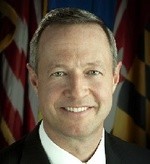 Wikimedia
Wikimedia Martin O'Malley
Who is he? He’s a former governor of Maryland and mayor of Baltimore.
Is he running? Yes. He announced his campaign on May 30.
Who wants him to run? Not clear. He has some of the leftism of Bernie Sanders or Elizabeth Warren, but without the same grassroots excitement.
Can he win the nomination? At the moment, O’Malley seems caught between Sanders, who has grasped the progressive mantle, and Clinton, who dominates the Democratic race overall. As with Sanders, though, it’s hard to see where O'Malley would get an opening unless Clinton’s campaign fell apart. The conventional wisdom since protests over the death of Freddie Gray is that protests in Baltimore undermine the case for his candidacy and make it harder for him to run, but he’s embraced the protests as a motivation for his run.
What else do we know? Have you heard that he plays in a Celtic rock band? You have? Oh.
Does his website have a good 404 page? No.
 Wikimedia
Wikimedia Bernie Sanders
Who is he? A self-professed socialist, Sanders represented Vermont in the U.S. House from 1991 to 2007, when he won a seat in the Senate.
Is he running? Yes. He announced April 30.
Who wants him to run? Far-left Democrats; socialists; Brooklyn-accent aficionados.
Can he win the nomination? It remains extremely difficult to see him winning the nomination, on the basis that primary voters tend to gravitate to “electable” general-election candidates alone. But he’s proven an ability to poll well into double digits, and he has a fired-up grassroots base. If nothing else, his campaign seems to be succeeding in getting his progressive ideas into the mix.
Does his website have a good 404 page? Yes, and it is quintessentially Sanders.
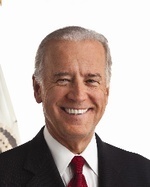 Wikimedia
Wikimedia Joe Biden
Who is he? Biden, a longtime Delaware senator, is vice president and the foremost American advocate for aviator sunglasses and passenger rail.
Is he running? He's made no serious steps toward a run, but whispers have grown since the death of his son Beau Biden in May. The Biden family hadn’t publicly noted that Beau Biden was ill, but his father’s time seems to have been absorbed with caring for him.
Who wants him to run? The Wall Street Journal reports that both Beau Biden and his brother Hunter encouraged their father to run. The group Draft Biden (slogan: “I’m Ridin’ With Biden”) continues to do its best. But so far, the vice president has made few steps that would suggest a real campaign.
Can he win the nomination? If Clinton didn't run, it would throw the Democratic field into disarray. But probably not. At 72, Biden would also be an unusually elderly candidate.
When will he announce? It seems likely that he won't.
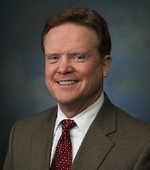 Wikimedia
Wikimedia Jim Webb
Who is he? Webb is a Vietnam War hero and secretary of the Navy. The author of several books, he served as a senator from Virginia from 2007 to 2013.
Is he running? He has launched an exploratory committee. In mid-June, he said he’d make a final decision within two weeks—so any day now.
Who wants him to run? Dovish Democrats; socially conservative, economically populist Democrats; the Anybody-But-Hillary camp.
Can he win the nomination? Probably not. While Webb was the perfect candidate for Senate from Virginia in 2006, his statement in support of the Confederate flag shows why he probably has little hope in the national Democratic Party.
Does his website have a good 404 page? No.
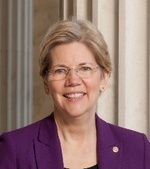 Wikimedia
Wikimedia Elizabeth Warren
Who is she? Warren has taken an improbable path from Oklahoma, to Harvard Law School, to progressive heartthrob, to Massachusetts senator.
Is she running? No. Seriously, no.
Who wants her to run? Progressive Democrats; economic populists, disaffected Obamans, disaffected Bushites.
Can she win the nomination? No, because she's not running.









In Praise of the Unhinged Protest Song

Neil Young has made an album taking aim at huge corporations and powerful politicians, but he knows that his mission of changing the world faces an even more formidable enemy: listeners. “People want to hear about love,” he sings over and over again on the third track of his new record The Monsanto Years. “Don't talk about the Chevron millions going to the pipeline politicians … don’t say Citizens United has killed democracy … don’t say pesticides are causing autistic children,” and so on.
Related Story
How James Taylor Finally Reached Number 1
What is Mr. “Let’s Impeach the President” doing declaring political music futile? Is he attention-policing, like those folks who lamented how #TheDress distracted people from caring about global warming, except instead of a meme he’s talking about love itself? Is he challenging the audience to prove him wrong? Is he just imitating the squares in record-label offices? Maybe it’s all of that. But he’s also probably sending out a signal to a certain kind of listener, the kind who already has plenty of firmly held opinions about Chevron, Citizens United, pesticides, and music’s role in fighting them. “People” just want silly love songs, but you, Neil Young diehard and possible signer of petitions against Starbucks, are better than “people.”
The arrival of The Monsanto Years, Young’s 36th album, resurrects the eternal question of whether music can successfully play politics. Contrary to some Dylan-worshippers’ complaints, protest songs haven’t died—hip-hop’s taking up the banner of Black Lives Matter, Muse just put out an album about drones, and Young has blasted at least three Republican presidents over the decades. But across genres and performer demographics, it’s hard to find examples of politicians who’ve changed their votes because of a song, or even citizens who have. What music can do is help solidify political identities and offer a rallying call for causes: As Michael Barthel wrote at Salon in 2012, “‘protest music’ doesn’t mean music that gets us to protest, but music that is frequently heard at protests.”
If preaching to the converted is its sole ambition, The Monsanto Years might just succeed, giving marchers against genetically modified foods and agribusiness something to play on the loudspeakers. Backed by his band, The Promise of the Real, the album’s packed with crisp, crunchy classic rock, and the 69-year-old makes smart use of the sorrowful twinge in his voice. It didn’t help me figure out whether Monsanto is actually sending humanity to extinction or if its bad rap from Greenpeace is overblown, but it did teach me just how fun its name is to say. Young sings the syllables a bit like the witch’s guards in Wizard of Oz might: Mahn sannn, tohhh…
For the most part though, to anyone who’s not already in the market for an audio bumper sticker against GMOs, The Monsanto Years will inspire only groans. Young sounds like he’s playing liberal-pundit bingo, serving up phrases like “too big to fail” without attempting to make them sound anything other than hackneyed. See if you want to sing along to this:
When the people of Vermont wanted to label food with GMOs
So that they could find out what was in what the farmer grows
Monsanto and Starbucks through the Grocery Manufacturers Alliance
They sued the state of Vermont to overturn the people's will
Are those lyrics or a blog post? The laziness of the writing on verses like this is enough to make you hear the wounded idealism of “People Want to Hear About Love” as almost sinister. Young makes it sound like political subject matter alienates listeners from songs, but on The Monsanto Years the greater danger seems to be that political subject matter alienates songwriters from their talents.
It doesn’t have to be this way. The dreary pedantry of The Monsanto Years only becomes starker when compared to some other politically tinged works lately—Kendrick Lamar’s transportive headtrip of To Pimp a Butterfly, or Against Me!’s empathy bomb Transgender Dysphoria Blues. One especially relevant companion-by-contrast piece to Young’s album came out this month, from Desaparecidos, the long-dormant pop-punk band fronted by Conor Oberst of Bright Eyes. The record, called Payola, is as brazenly political and unsubtle as The Monsanto Years is, blasting Wall Street, the NSA, health insurance providers, the record industry, and all sorts of other bogeymen for Occupy types. But it’s also sublime and funny and scathing, the kind of thing that might rope in the apathetic through sheer rock-and-roll energy—and then, just maybe, radicalize them.
Oberst is working in the punk tradition of rebellion as an aesthetic value rather than a purely political one, and it’s not clear how earnest he’s being when, for example, he opens the album calling for people to chain themselves to ATMs. But the weeping-sad singing style he’s built an audience with as an indie songwriter proves useful here—even if the words aren’t totally serious, the rage behind them is. The eminently replayable second song, “Underground Man,” builds momentum with each line that he spits, aimed at an undefined-because-it-doesn’t-need-to-be-defined they. “They made activism trite!” he screams, though the ferocious and catchy music makes activism sound anything but.
Elsewhere, the targets, the heroes, and the solutions are more defined. “Te Amo Camila Vallejo” should introduce a large swath of rock fans to the work of the Chilean student-politician of its title, and “Slacktivist” mockingly praises the first-world mentality that says you can fight injustice by donating a dollar with your coffee cup. And Oberst puts all of Young’s cut-and-paste anti-capitalism to shame with “Golden Parachutes,” a song-length ad hominem attack against Wall Street, with Oberst memorably labeling a banker “a bloated Dillinger / a spray-tanned Jesse James.”
Most chillingly, “MariKKKopa” offers a nightmarish vision of what might happen if anti-immigrant sentiments ratchet any higher in parts of the Southwest, closing with a clip of Sheriff Joe Arpaio saying it’s an honor to be compared to the KKK. Even Arpaio’s biggest haters might agree that the soundbite is taken a bit out of context, and others might hear the song and worry that Oberst is squeezing a little too much mosh material out of the horrifying idea of modern-day lynching. But sensitivity and proportion aren’t the point on a record like this. Inciting is.
By contrast, the most moving thing on The Monsanto Years is the mournful, ambiguous album-closing jam “If I Don’t Know.” Young’s back to questioning the value of political songs: “If the melodies stay pretty, and the songs are not too long, I'll try to find a way to get them back to you,” he sings, with them presumably being the various messages of the album. He’s on the right track—music has to work at music. But if music’s also going to work as politics, it’d better have some bite, too.









The Unconvincing Conservative Embrace of Same-Sex Marriage

All of a sudden, conservatives were never really against gay marriage to begin with. They just wanted to achieve it through the democratic process. “Many people will rejoice at this decision, and I begrudge none of their celebration,” wrote Chief Justice John Roberts in his dissent, implying that he thinks gay marriage is a delightful thing. On Fox News, The Weekly Standard’s Stephen Hayes endorsed gay marriage but called the Court’s decision “the wrong way to do the right thing.”
Forgive my cynicism, but I don’t buy it. First, the conservatives who say they want same-sex marriage but only through the democratic process don’t acknowledge just how devastating that principle would be to millions of LGBT Americans who want to marry the person they love. After all, if it’s wrong for the Supreme Court to require same-sex marriage, then it’s just as wrong for lower courts to do so. But of the 37 states that had legalized gay marriage on the eve of the Court’s decision, 26 had done so via lower courts.* Only 11 states had legalized it through the legislative process or by popular referendum. That means that, in Roberts and Hayes’ ideal world, gay and lesbian Americans in 39 states would still lack marriage rights. Thirty-one of those states, as Charles Lane noted on the Fox panel with Hayes, have passed constitutional amendments banning same-sex marriage. Undoing those amendments democratically, especially in states like Utah, Alabama, and Mississippi, would have taken a long time—Hayes himself estimated 15 to 20 years. If you’re fine telling millions of gay Americans to wait that long, you don’t really consider same-sex marriage that important.
Second, the principle that the Supreme Court should never remove controversial subjects from the democratic arena is not one conservatives adhere to very scrupulously. Perhaps it’s my forgetfulness, but I don’t remember many conservatives reacting to the Roberts Court’s decision to invalidate campaign-finance laws by declaring that, while they oppose such laws, they only want them repealed democratically. In fact, I’m unaware of any recent court decision whose policy implications conservatives supported but which they nonetheless opposed for democracy’s sake. That includes Bush v. Gore, when the Supreme Court told Florida to stop counting ballots and effectively chose America’s president in 2000.
Third, if we’re supposed to believe that the conservatives who opposed the Court’s decision really, really support same-sex marriage but just want to achieve it democratically, then it’s worth asking what exactly they have done to further the cause. Type “Weekly Standard” and “same-sex marriage” and you’re not exactly showered with paeans to idea. In fact, among the first 15 articles and blogs on the subject, I couldn’t find one supporting same-sex marriage. (Though third on the list was an article calling the gay marriage movement “more and more totalitarian.”)
And it’s not just his own magazine that Hayes has proved unable to convince. Not a single Republican presidential candidate supports same-sex marriage—not via the legislative process, via referendum, or in any other way. When conservatives believe in something passionately—think of their opposition to Obama’s nuclear deal with Iran—they’re pretty good at getting their perspective heard and at getting GOP politicians on board. But you have to strain awfully hard to hear the drumbeat of conservatives calling for same-sex marriage but only through the democratic process. In fact, it’s an argument you hear most when conservatives are looking for a way to make their opposition to pro-marriage equality court decisions more palatable. It’s a little like President Obama and other liberals who in 2008 called for sending more troops to Afghanistan while withdrawing them from Iraq. Were they really that excited about doubling down in Afghanistan? Not really. But it made their opposition to Iraq sound less extreme.
Obviously, there’s a distinction between believing something is good policy and believing the Constitution guarantees it. It’s just not a distinction the Beltway right has a record of caring very much about. And in opposing the greatest judicial affirmation of American equality in our time, they’ve chosen a very odd time to start.
Does Disney's Pocahontas Do More Harm Than Good? Your Thoughts

For the 20th anniversary of the movie, my colleague Sophie Gilbert made the case that Pocahontas is “Disney’s most radical heroine”:
[The studio] had, for the first time, based an entire picture around an adult female, let alone a woman of color. It was also the first time the studio had produced a film about a real person. [...] The film also seemed to embrace an environmentalist message, with Pocahontas showing Smith the absurdity of relentlessly taking things from the Earth instead of seeing its potential. It was a radical story about female agency and empathy disguised as a rather sappy romance [...]
JamesAllen provides a reality check:
Engraving of Pocahontas, 1616 (Wiki)
The real Pocahontas was married off to a white man old enough to be her father when she was a teenager. She was then trotted around as a “noble savage” for a few years before she got sick and died. Her culture was destroyed and her relatives murdered.
The Disney movie itself might have been okay, I guess, and the commenters saying it was made with good intentions may be correct. But the actual story of Pocahontas was grim and brutal. Turning a story like that into something fluffy and “empowering” is just uncomfortable.
TonyChen4 goes further:
This movie never should have been made. European conquest of the Americas is not children’s entertainment.
For the record, Sophie did acknowledge the movie’s “historical liberties,” “fudging some facts,” and the “controversy that arose at the time,” as well as “depicting the English settlers as plunderers searching for non-existent gold who were intent upon murdering the ‘savages,’” but many readers felt she didn’t go far enough. Another one is the curiously named Crud Bonemeal:
Pocahontas was a clunky attempt at the sort of watered-down corporate ‘inclusivity’—seen everywhere in the 1990s—that downplays differences of background and opinion, and completely ignores the grim wheel of history in favor of a fuzzy, feel-good narrative that viewers never have to really ponder afterwards.
A key scene from the movie, so you can see for yourself:
Sooner Davenport’s take on the heroine:
Consider the cohort of Disney females that “Pocahontas” supposedly belongs to: a group of young women who are IMAGINARY or based on MYTH. The reason why the indigenous communities are unhappy about the film and this article is because they are fed up that Western culture only wants to interact with our narratives if they are heavily romanticized and fictitious.
Another Native American woman, Kenzie Allen, a descendant of the Oneida Tribe of Indians of Wisconsin, emails her response:
I’ve struggled with Disney’s Pocahontas as a source of pain and stereotype. Both Pocahontas and Sacagawea are often held up as heroines in the Western perspective, their stories reduced to kinder details rather than serving the interest of the dominant culture. Yes, there is visibility in telling their stories, but it is a tainted visibility, a false reality rendered through the dominant culture, which seeks to ameliorate, always, the horrific methods by which they came to occupy an entire nation’s worth of landmass.
Nobody wants to feel like a settler. Disney’s Pocahontas gives just enough of a flogging to the “real” bad guys to leave the non-native viewers coming away feeling as though they’ve done the good work of recognizing their own faults, while the pain of forced assimilation and erasure continues for the Powhatan Nation and others.
It is the Western lens that sees a progressive narrative in the way the settlers of Disney’s movie are mocked (but eventually befriended), the way Pocahontas rejects a voyage overseas (but was in reality kidnapped—and in the sequel, even this part of the story is made family-friendly and song-worthy), and the way she chooses family over love (when in reality her “choice” was anything but). [A scene from the sequel:
Disney goes so far as to try to turn the narrative around by having the Powhatans call the settlers the “savages,” but it’s only done half-way. Much like coverage of mascot issues often features white voices in the interest of “fair and balanced coverage,” the movie ends with the two groups considered even, with no indication of the devastation yet to come.
If Disney’s choice was between being “accurate” or “socially responsible,” my question would be: socially responsible to whom?
Or as Jason KL puts it, “It’s as if the Titanic movie had ended right before the ship sank.” Sophie responds to her critics:
The idea for the piece came about because I was rewatching the movie after many, many years and I was struck by how original it was in a number of ways. The Disney character of Pocahontas seemed to be different from many other cartoon heroines of the time, and it made me want to explore her place in the canon, and how it might have influenced Disney heroines to come.
Then, after doing some research, I learned that Pocahontas was only the seventh animated Disney film based on a female heroine in more than half a century, and the first film based on a character of color, which I thought was intriguing. My piece was intended primarily to look at how that came about. I find it hard to imagine a major children’s entertainment corporation could make a film like that today—one that promotes an environmentalist agenda and focuses on a strong female character considering her independence—without sparking outrage in some circles.
“Pocahontas Saving John Smith” (Wiki)
I did research into how the film was received at the time, and found two critiques of it from a Native American perspective—the statement from Powhatan Nation, and the op-ed in The Los Angeles Times, both of which I quoted in the piece. What I didn’t read so much about, and what I understand now is felt by many people still, is the anger at the fact that this movie was ever made.
I’ve learned from so many of the responses that many people feel it was egregious for Disney to take Pocahontas, a real person who was treated shamefully by the English settlers, kidnapped, and forced into marriage, and fictionalize her story to the point where it became a romance and a tale ostensibly promoting equality between races. I can absolutely understand this and I’m truly sorry if my piece caused anger or sadness by neglecting this point. My intention was never to do this, and I’m so grateful for the thoughtful discourse that’s followed and the opportunity to learn more. I’m hoping to work with some of the people I’ve heard from on an essay that explores the objections to the movie in more detail.
Commenter jeff_14 comes to Sophie’s defense:
The purpose of great fiction is to tell great truths. Shakespeare’s plays and Mel Gibson’s films are wildly inaccurate historically, yet they tell powerful stories. (Ironically Gibson was the voice of John Smith in Pocahontas which was released the same year as Braveheart.) A little fudging is acceptable if done for a good purpose. Pocahontas was not a traditional damsel in distress/princess love story. It showed a strong woman making her own choices.
Tariray points to a strong character who debuted three years before Pocahontas:
Sophie Gilbert forgot Jasmine—a princess who outright refuses an arranged marriage and falls in love with a street rat. She’s a princess who fights for herself and is intelligent enough to manipulate Jafar when required. She also wears friggin' pants. Oh, and in the cartoon series, Jasmine kicks some major ass because she actually knows how to fight.
I think it’s more of an evolution of more independent and heroic female main characters—and I think it began with Ariel. She may have been dumb enough to give up her voice for a dude, but remember that it was also out of her own curiosity to be human. Even the lyrics of "Part of Your World" are empowering:
Bet you on land, they understand
Bet they don't reprimand their daughters
Bright young women, sick of swimmin', ready to stand.Rather than pointing Pocahontas out as the strongliest of strong women, she is just one in a huge line of increasingly more assertive and inspirational women that Disney has been churning out. They all have their flaws, but they all have a seed of strength that Snow White, Cinderella and Princess Aurora didn't have.
One more reader, IrishEyes2787, and one more princess:
I understand that you’re trying to make a point about the strength of Pocahontas as a character (and I don't disagree with you entirely), but I have to stand up for my girl Belle. Far from being "uncertain and naive," Belle has a very strong will, an equally strong sense of herself, and an impressive set of wits to boot.
Belle is the first truly proactive Disney heroine; she’s the one steering the story from the beginning. And when she does give up her freedom it is not, as you say, for romantic love, but rather to ensure the protection of her father. What’s more, when she learns that her father’s health has deteriorated and that he’s in trouble, she makes the choice to leave the Beast with hardly a second thought, and with no plan to return, regardless of the love she has come to feel for him, choosing her family and her duty above her heart.









Greece Debt Crisis: Live Updates

9:22 a.m.
Markets across Asia rebounded strongly with the Tokyo Nikkei closing up 0.63 percent, Hong Kong’s Hang Sang Index up 1.09 percent, Seoul up 0.67 percent, and the Shanghai Composite up 5.6 percent. The euro is down, but some investors and traders say the experts will wait to see how the debt crisis pans out before making big moves.
8:59 a.m.
According to the Wall Street Journal, Greece’s finance minister has said that some bank branches may reopen on Wednesday to service those who don’t have access to debt or credit cards, including many pension recipients. Withdrawals will be limited to €120 ($134). The finance minister, Yanis Varoufakis, has also said that Greece has no intention of paying the IMF by the end of Tuesday’s deadline, and that he instead hopes that a last-minute deal is reached.
—Gillian White
8:42 a.m.
World markets are still on edge as Greece nears its deadline. News of the a last-minute deal have given European stocks a boost and U.S. futures are also looking up.
Tom Metcalf and Robert Lafranco over at Bloomberg tallied how much the world’s 400 richest people lost yesterday and arrived at a combined $70 billion, or an average of $175 million each.
—Bourree Lam
8:04 a.m.
Last-minute talks are reportedly happening in Athens. One of Greece’s creditors, the European Commission, has reached out to make a deal—though it remains unclear what the details of the deal are and whether this is the same deal from last week.
The new offer will likely involve Prime Minister Alexis Tsipras trying to encourage Greeks to vote “yes” in Sunday’s referendum. Yesterday, Tsipras appeared on television to appeal to Greeks to vote “no.” Tsipras has been hinting that he would resign if the outcome of the vote is a “yes.”
—Bourree Lam
7:51 a.m.
On Tuesday, markets in Asia recouped the losses sustained during Monday’s sell off on the news of an impending Greek default. In China, stocks gained about 5.6 percent.
—Gillian White
Greece is officially out of time.
A decision on whether or not the deeply indebted country will work out a plan with its creditors or default on the €1.54 billion ($1.69 billion) it owes to the IMF and EU—a move that could serve as the prelude to the country exiting the eurozone, the much feared “Grexit”— has come down to the wire, with the country’s future still uncertain today, the deadline for payments or extension. Notable economists have called for Greece to sign a deal immediately, and for its creditors to abandon austerity.
On Monday, the English text of the Greece’s referendum ballot question was posted to Twitter.
Should the agreement plan submitted by the European Commission, European Central Bank and the International Monetary Fund to the June 25 eurogroup and consisting of two parts, which form their single proposal, be accepted? The first document is titled ‘Reforms for the completion of the Current Program and Beyond’ and the second ‘Preliminary Debt sustainability Analysis’.
On July 5 Greek citizens will vote yes or no to the proposal.
The situation is already bleak. According to one estimate, Greece owes its lenders a total of €242.8 billion ($271 billion). In Greece, banks are closed, capital controls have been imposed, and the stock market shuttered. The rest of the world doesn’t have much faith in the ability for a deal to get done either. On Monday, stocks in the U.S. had their worst showing in 2015, as the Dow tumbled 350 points and the S&P had its worst day of the year Monday.
The post below will be continually updated above.









Amy Schumer and the Growing Pains of Comedy
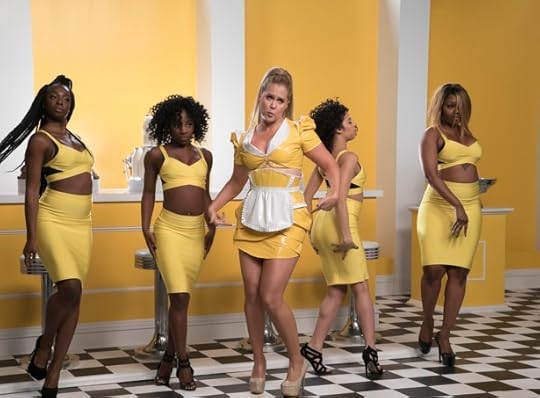
There’s a fine line in comedy between subversive and offensive, and with every meteoric rise from stand-up to film and television stardom these days, there tends to be controversy over whether or not that line has ever been crossed. Amy Schumer, whose Comedy Central sketch show Inside Amy Schumer has been dominating the Internet on a weekly basis since its third season debuted in April, and who stars in the upcoming Judd Apatow comedy Trainwreck, is the latest figure to experience the pitfalls of being under such sharp scrutiny. A recent profile of Schumer in The Guardian by Monica Heisey, although largely positive, criticizes the comedian for having a “shockingly large blind spot” on race—and cites some clunky jokes she’s made about Latinos as examples.
Related Story
It’s rarely a challenge to unearth weak, or even offensive, jokes in a stand-up act, since any comedian’s work is in a state of constant evolution. The material Heisey highlights suffers in retrospect not just because it plays on dull stereotypes, but also because it’s not that well-crafted or funny. Considering Schumer’s status as one of comedy’s newest public intellectuals, and how her sketches are so widely disseminated online, a deeper investigation into her history was probably inevitable. But it also calls attention to the unique pressures facing stand-up comedians who break into film and TV, where more sensitive material about subjects such as race can get lost in translation.
The criticism feels similar to the backlash directed at Trevor Noah when he was tapped to replace Jon Stewart on The Daily Show—a role that comes with astronomical expectations. While Noah quickly dismissed and otherwise ignored criticism of jokes he’d made on social media, Schumer is running directly at her critics, posting a long online statement defending her material. “I will joke about things you aren’t comfortable with. And that’s OK. Stick with me and trust I am joking,” she said. “That includes making dumb jokes involving race. I enjoy playing the girl who time to time says the dumbest thing possible.”
Though Schumer didn’t specifically cite Heisey’s article, or a Daily Dot piece skeptical of the comedian’s newfound reputation as a feminist hero, she’s clearly pushing back against these arguments. Such criticism is part of a larger debate about comedy, which has seen legendary figures like Jerry Seinfeld complaining that younger audiences are too “politically correct” for boundary-pushing humor, as well as critics arguing that complaints about the “outrage machine” are misguided and exaggerated. Schumer later noted that she hasn’t used any jokes about race in her act for more than two years. But she’s been forced to remind her fans that stand-up comedy is a performance like any other, and that jokes are delivered in character, no matter how personal the humor might be.
Like Sarah Silverman before her, Schumer roots her act in a simple subversion, playing off the thrill audiences get from seeing a woman speak frankly and outrageously on stage, especially about sexuality. Schumer’s “character” is often that of an ignorant, middle-class white woman whose comic sentiments underline her own stupidity and unacknowledged privilege. It’s an act that sometimes falls short—just like all stand-up acts often do.
Schumer plays off the thrill audiences get from seeing a woman speak frankly and outrageously on stage.To be sure, Schumer has courted controversy in the past, and not just because of jokes that unintentionally flopped. One of her first big breaks came on a Comedy Central Roast of Charlie Sheen: Addressing fellow roaster Steve-O, she made an off-color joke about his recently deceased Jackass co-star Ryan Dunn, saying, “I truly am—no joke—sorry for the loss of your friend Ryan Dunn. I know you must have been thinking, ‘It could have been me.’ And I know we were all thinking, ‘Why wasn’t it?’” The line drew groans from the audience and a pained look from Steve-O, and an onslaught of abuse and death threats on Twitter for Schumer from his fans (something no other roaster has experienced). But her appearance on the roast also galvanized her career on Comedy Central and led to the network greenlighting Inside Amy Schumer.
To her credit, she hasn’t simply repeated her routines and approaches as she’s moved to other mediums. One of her contemporaries, Anthony Jeselnik, also rose to fame via Comedy Central’s roasts, but translated that into a show called The Jeselnik Offensive, where he mostly delivered roast-style jokes to other comedians and celebrities. Schumer has instead used TV as a platform to address all kinds of issues on a more ambitious scale, in ways both absurd and shrewd, while remaining brutally funny. One sketch this season turned a spoof the TV show Friday Night Lights into a blunt-force skewering of the ways athletes dodge rape allegations; another highlighted how women often lean on the word “sorry” when there’s nothing to apologize for. Heisey’s article identified one sketch as being about black employees at Urban Outfitters looking the same, but the joke there is on Schumer, not anyone else, as she ties herself in guilty knots trying to identify an employee without mentioning his skin color.
Like Noah, Schumer’s brand of comedy earned her an invitation to take over The Daily Show, an opportunity she declined. But she’s never resisted an opportunity to point out human folly or make people laugh while also making them at least a little uncomfortable.
You could micro-analyze every joke Schumer has told, good and bad, but that would undermine the value of the experimental nature of stand-up, which lives in the split moment an audience decides to—or not to—laugh. This isn’t to say Schumer’s comedy doesn’t have the power to offend, or that people don’t have the right to be put off by her particular persona. It’s simply to acknowledge that it’s unfair and impossible to ask a comedian to push boundaries without also giving them room to write material that sometimes falls short, or pushes too hard.









June 29, 2015
What's Really Happening in Puerto Rico?

Puerto Rico is a small island with some big financial problems. Governor Alejandro Garcia Padilla recently told the New York Times that there was no way the island, which has been struggling with about $72 billion of debt, would be able to pay, and instead would try to work out new deals and deferred payments with some of its creditors. This, of course, has lead to fears that the commonwealth will default on its loans.
The admission that Puerto Rico’s finances are much worse than originally thought was spurred by a report commissioned by the Government Development Bank, an agency tasked with developing economic and financial strategies for the commonwealth, and conducted by current and former IMF staffers. The report, nicknamed The Krueger Plan for it’s lead author Anne Krueger, doesn’t mince words when it comes to the outlook for the debt-laden island: "Structural problems, economic shocks and weak public finances have yielded a decade of stagnation, outmigration and debt. Financial markets once looked past these realities but have since cut off the commonwealth from normal market access. A crisis looms.”
Puerto Rico’s problems are large and interdependent, which makes solving them a complex and difficult task. Tourism is down, employment is low, poverty is high, and the island has suffered through the economic pain of falling home values, rising oil prices, and overall decreased competitiveness.
Employment stands out as a terrible problem: Only 40 percent of adults are working or looking for work (compared to 63 percent across the U.S.). Relative to local incomes, federal minimum wages and welfare benefits are pretty high (Puerto Rico follows federal law), which means companies hire less because of burdensome costs, and workers lack incentive to work, since they know that welfare benefits can provide similar income. Without more jobs available, those who do want to work struggle to find employment and often head to the mainland—contributing to nearly a decade of population loss.
Puerto Rico’s tenuous situation and potential debt default haven’t come as surprises. For years, the island has relied heavily on borrowing via bonds to cover the costs of everything from pensions to government services. Even as the economy shrank, public-sector debt grew. “The economy is in a vicious circle where unsustainable public finances are feeding into uncertainty and low growth, which in turn is raising the fiscal deficit and the debt ratio,” the report found.
The problem goes beyond temporary economic weakness, the report goes on to say, and includes the staggering failure to adequately account for revenues and expenditures. For instance, the report finds that revenues were consistently overestimated by about $1.5 billion each year, while the government drastically underestimated the amount it would have to pay out in tax refunds. And even mid-year corrections did little to stem spending, since the Office of Budget and Management has no power to enforce budget cuts, setting Puerto Rico up for a consistent shortfall.
While the recent news focuses on the immediacy of whether or not Puerto Rico will be able to pay its debt—such as the $94 million due on July 15, or the $140 million due on August 1—the problem goes beyond the need for a new payment plan. Puerto Rico’s economy is in serious trouble.
“This has been obvious for a couple of years now,” says Barry Bosworth, a senior fellow of economic studies at the Brookings Institution, who notes that the island’s debt has been steadily downgraded for years, a sign that trouble was brewing. To make matters worse, unlike Detroit or other municipalities, Puerto Rico doesn’t have the option of filing for bankruptcy, leaving few options in the face of a debt crisis.
Those invested in Puerto Rico’s bonds, which have been used to finance the struggling commonwealth for years, will certainly face losses as bonds lose value in the face of default. But the biggest impact will be for the people of Puerto Rico: The report includes recommendations like restructuring debt payments, increasing taxes, cutting back on teachers (the number of teachers has grown 10 percent in the past decade as the number of students declined 40 percent), reducing subsidies to the University of Puerto Rico, and reductions in benefits for government safety nets such as Medicaid and minimum wage.
But even the potential success of the plan outlined in the report may not be enough to salvage the economy in the long run. “The trouble with the financial restructuring and debt relief is that if you don’t have a plan in place, you’ll need a second program,” says Bosworth. “That’s not going to solve their problem.” And cuts to government aid programs may only serve to accelerate the number of Puerto Ricans leaving the island in hopes of creating a better life on the mainland, where poverty is lower and jobs more plentiful. Real change would require steps that seem unlikely, like intervention by the federal government—which has thus far taken a hands off approach, with the White House saying Monday that they would not step in for a bailout—or a plan that would entice multinational firms to do business in the Puerto Rico. Neither option seems feasible at the moment, says Bosworth.
“There’s a lot of focus on debt, but the steady deterioration of the economy is the bigger problem,” he observes. “It’s going to get pretty grim.”









Atlantic Monthly Contributors's Blog
- Atlantic Monthly Contributors's profile
- 1 follower












